Welcome back to This Week in Apps, the weekly TechCrunch series that recaps the latest in mobile OS news, mobile applications and the overall app economy.
The app industry continues to grow, with a record number of downloads and consumer spending across both the iOS and Google Play stores combined in 2021, according to the latest year-end reports. Global spending across iOS, Google Play and third-party Android app stores in China grew 19% in 2021 to reach $170 billion. Downloads of apps also grew by 5%, reaching 230 billion in 2021, and mobile ad spend grew 23% year over year to reach $295 billion.
Today’s consumers now spend more time in apps than ever before — even topping the time they spend watching TV, in some cases. The average American watches 3.1 hours of TV per day, for example, but in 2021, they spent 4.1 hours on their mobile device. And they’re not even the world’s heaviest mobile users. In markets like Brazil, Indonesia and South Korea, users surpassed five hours per day in mobile apps in 2021.
Apps aren’t just a way to pass idle hours, either. They can grow to become huge businesses. In 2021, 233 apps and games generated over $100 million in consumer spend, and 13 topped $1 billion in revenue. This was up 20% from 2020, when 193 apps and games topped $100 million in annual consumer spend, and just eight apps topped $1 billion.
This Week in Apps offers a way to keep up with this fast-moving industry in one place, with the latest from the world of apps, including news, updates, startup fundings, mergers and acquisitions, and suggestions about new apps to try, too.
Do you want This Week in Apps in your inbox every Saturday? Sign up here: techcrunch.com/newsletters
Top Stories
Russia’s app economy shuts down
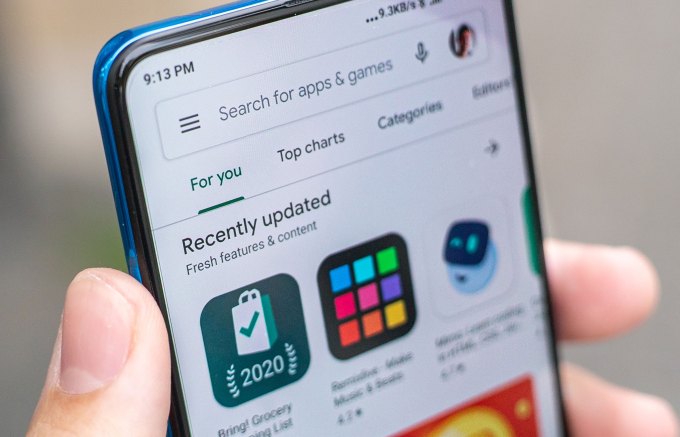
Image Credits: Mika Baumeister / Unsplash
As the Russia-Ukraine war continued this week, the app ecosystem also saw further impacts. As businesses pulled out of Russia, the ability for Russian consumers to transact on the app stores and in apps is similarly being impacted. This week, Google announced it was suspending Google Play’s billing system for users in Russia in the “coming days,” which means Russian users won’t be able to purchase apps and games, make subscription payments or conduct any other in-app purchases of digital goods using Google Play in Russia. Free apps will remain available on the Play Store, the company said.
But the app platform themselves don’t necessarily have to shut down payments for Russian users to experience issues with billing and transactions, as some Russian App Store users now are. That’s because this week Visa, Mastercard and American Express all announced they would suspend operations in Russia in protest of its invasion of Ukraine. If App Store or Google Play users had these cards on file, they would have stopped working anyway.
Numerous tech companies, including Apple, Airbnb, Microsoft, Adobe, PayPal, Netflix, Snap and many others have also suspended sales and operations in Russia as a result of Russia’s invasion of Ukraine. In addition to the humanitarian reasons for their exit, there are other costs — sanctions and complications with payments make it difficult to continue supporting Russian customers regardless.
Google fixes Apple’s messaging issues with app update
Alongside a wider Android update, Google announced new features designed to work around Apple’s decision to continue to support SMS instead of the newer and more modern standard RCS. This week, Google’s Messages app, which comes pre-installed on most Android phones, was updated to address the long-standing issue where iMessage’s “Tapbacks” weren’t delivered as emoji reactions, but were rather sent as a separate message. It’s been an annoyance that’s made chats between Android and iPhone users confusing, cluttered and far too noisy.
After the update, reactions from iPhone users will be sent as an emoji on text messages on Android. As on iMessage, the emoji reaction — like love, laughter, confusion or excitement — will appear on the right side of the message. (On Android, it’s the bottom right.) Android’s interpretation of which emoji to use varies slightly from iPhone, however. For instance, the “heart” reaction on Android becomes the “face with the heart eyes” emoji. And the iMessage’s exclamation mark reaction becomes the “face with the open mouth” emoji. This update is first rolling out to Android devices set to English, but additional languages will follow.
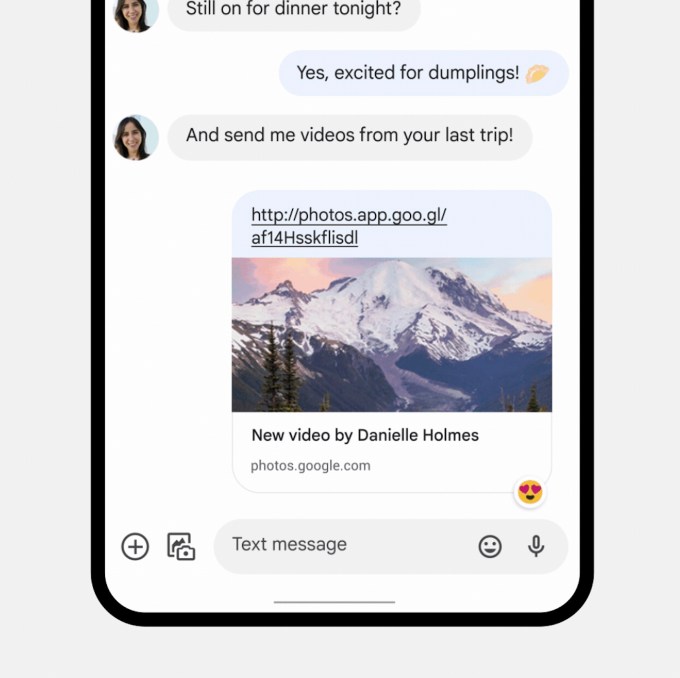
Image Credits: Google
Related to the lack of RCS support, Google also integrated Google Photos into the Messages app to improve the video-sharing experience between iOS and Android users. While people with Android devices can share high-quality videos with each other, those same videos appear blurry when shared with those on iPhone, as iMessage doesn’t support RCS. By sending the link to the video through Google Photos, iPhone users will be able to watch the video in the same high resolution. This feature will later include support for photos, too.
Google thus far has been very vocal about Apple’s decision to avoid supporting RCS — largely because RCS adoption would allow Google to better compete with Apple’s iMessage. But Google is not wrong when it points out that Apple is not serving its own customers very well by having iMessage fall back to the older standard of SMS, which is less secure. (An odd choice for a privacy-focused company like Apple claims to be.) It also leads to an inconsistent messaging experience, where features like typing indicators, read receipts and high-res media sharing don’t work in some chats.
Apple, to some extent, benefits by making SMS the “worse” experience, as this can help with ecosystem lock-in. But critics argue that decisions like this have led to iMessage failing as a global messaging champion, benefitting third-party messaging apps. Users worldwide have turned to other messaging apps in part because Apple chose not to compete on Android, or even keep up with the baseline features for modern-day messaging.
Weekly News
Platforms: Apple

Image Credits: Apple
- Apple introduced a range of new devices at its “Peek Performance” event this week, including a new iPhone SE with the same A15 Bionic chip as iPhone 13; a new iPad Air with an M1processor; a new M1 Ultra chip and the machine it powers, the Mac Studio; and a new Apple display called the Studio Display.
- As a part of that news, Apple noted iOS 15.4 is set to roll out next week. The update brings several new features, including Face ID that works with face masks, Tap to Pay, new AirTag safety features, a new Siri voice, and more. iPadOS 15.4, macOS Monterey 12.3, watchOS 8.5 and tvOS 15.4 will also become available.
- Apple informed its developer community that it’s suspending its Apple Search Ads service on the App Store in Russia “until further notice.”
Platforms: Google

Image Credits: Google
- Google launched Android 12L, the version of Android designed for larger-screen devices and foldables. Samsung, Lenovo and Microsoft have committed to rolling out the OS later this year on select devices.
- Google rolled out Air Raid Alerts to Android phones in Ukraine, the company announced Thursday. The system leveraged the low latency alert mechanism that was already built for other natural disasters, like earthquake alerts, and relies on information provided by the Ukrainian government.
- Google Play Store users in Russia will no longer be able to buy apps, games, IAPs and subscriptions due to payment system disruptions related to Western sanctions on Russian banks, Google said.
- Google Assistant and Google Pay can now help Android users pay for their parking, following the latest Android update. With the feature, users can say “Hey Google, pay for parking,” and follow the Assistant’s voice prompts from your phone. The system currently works with parking provider ParkMobile. The feature was part of a larger Android update.
- Google said it’s working on a new tool that could help users reclaim around 60% of app storage temporarily by removing parts of the app rather than removing it completely.
- Google’s latest Pixel Drop feature release brought Android’s “Night Sight” feature to Snapchat, Live Captions to phone calls, stickers created by your words in Gboard, an Interpreter mode for Live Translate to translate face-to-face conversations and other features.
E-commerce and Food Delivery
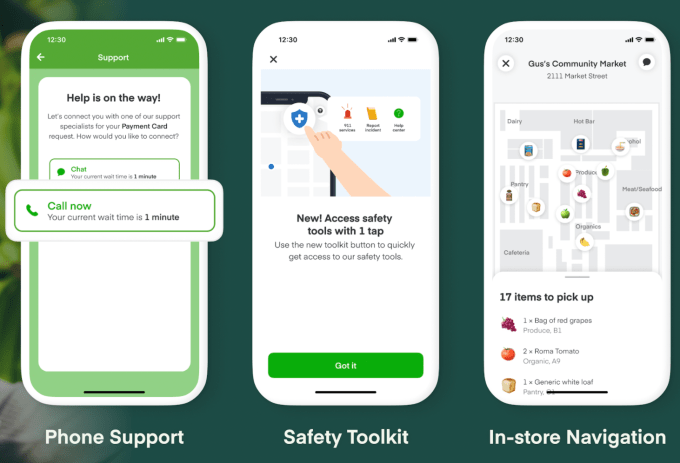
Image Credits: Instacart
- Grocery delivery service Instacart rolled out new in-store navigation and live phone support to the shoppers using its platform. The shoppers will be able to view an interactive map that includes item locations, in an initial pilot with 15 retail partners across more than 80 stores in 17 U.S. states and Canada. The live phone support feature will connect shoppers with reps in both the U.S. and international call centers. A new safety toolkit will give shoppers access to tools such as in-app emergency calling, incident reporting and safety alerts within their Shopper app.
- Grocery app Buyk, founded by two Russians, furloughed 98% of staff amid Russian sanctions. The company had sizable operations in NY and Chicago.
- Food delivery service Uber Eats relaunched its group ordering feature with a new bill splitting option that will allow U.S. users to create a group order where each person pays for their own food.
- Twitter expanded its e-commerce efforts with the launch of new mobile storefronts, called Twitter Shops. The feature will allow merchants to feature a catalog of up to 50 items on their Twitter profiles, which users access via an in-app browser.

Image Credits: Twitter
Fintech
- Trading app Robinhood was spotted working on a new Cash Card that promises no monthly fees, in-network ATM fees, overdraft fees or account minimums.
- An NYT report details how scams and fraud continue to impact the bank-backed P2P payments app Zelle, but how U.S. banks say returning money to fraud victims is not their responsibility.
- Block (the company previously called Square) is facing a probe by the Consumer Financial Protection Bureau and multiple state AGs over its Cash App’s handling of customer complaints and disputes, among other things.
- PayPal suspended its services in Russia, including money transfer service Xoom.
Social
- Instagram killed its Boomerang and Hyperlapse mobile apps. The editing apps were removed from the App Store and Google Play as Instagram continues to focus on Reels and other new features. Boomerang features were integrated into the Instagram camera already, however.
- Russia prosecutors have asked a court to ban Facebook and Instagram and designate Meta an “extremist organization,” after Reuters reported the comapny had temporarily eased its restrictions for calling for violence against Russian soldiers invading Ukraine. WhatsApp would not be impacted.
- Instagram began warning users in-app if they were sharing Russian state media and blocked state media from discovery areas in the app, including the Discovery tab and Reels. The company was already downranking state media. Private accounts in Russia and Ukraine will have their following and follower lists private and their mutual friend lists hidden, as well.
- Instagram added tags to posts to help ensure Black and underrepresented creators received credit for their work. Users will be able to tag other creators within their posts to give them more exposure, through the same “tag people” functionality as before, but then select “Show Profile Category” to display the creator’s category, like photographer, stylist and more.
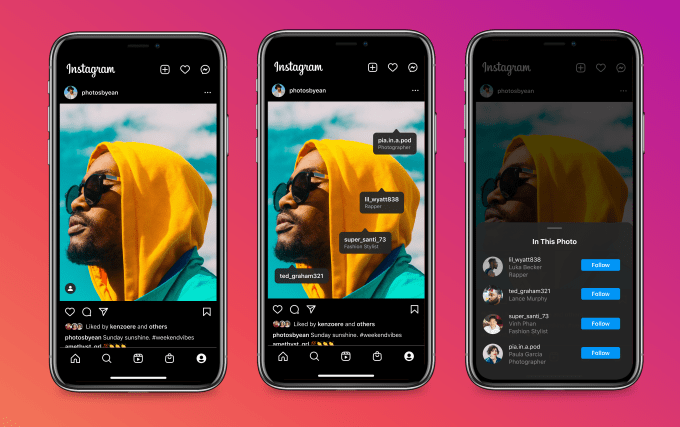
Image Credits: Instagram
-
- Twitter’s latest update will help users escape its recommendation algorithm. Following increased pressure from regulators for tech companies to provide ways for users to avoid algorithmic recommendation systems, Twitter has added a feature that lets you more easily navigate between its Home and Latest (algorithmic and recent) timelines in the app.
- Twitter launched a Tor service in Russia that allows users to bypass the government’s internet blocks that are stifling the flow of information. Twitter’s new Tor service is based on a version of the Enterprise Onion Toolkit (EOTK), a tool designed by cybersecurity researcher Alec Muffett, who announced the news on Twitter.
- Facebook updated its Community Help feature to allow Ukrainians to more easily find reliable information from local U.N. agencies and the Red Cross about where to find medical help, how to get assistance and more. The feature will appear for Ukrainian users both in and outside the country across Facebook and will also point to Ukraine’s State Emergency Services information helpline on WhatsApp.
- Facebook rolled out new features for Facebook Group admins, including the ability to automatically decline incoming posts with information marked false by fact-checkers. The company said this could help groups cut down on the spread of misinformation. Admins will also be able to temporarily suspend participants they’ve identified as bad actors from posting, commenting, reacting, participating in group chats and more. And they’ll be able to automatically decline member requests based on other criteria, like if they’ve answered the member questions.
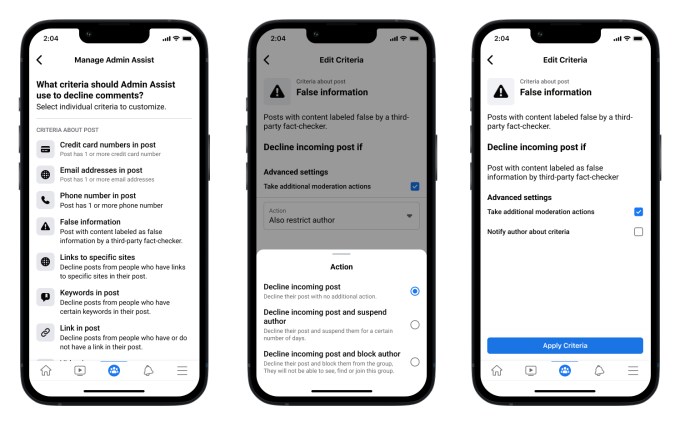
Image Credits: Meta
- Snapchat turned off its heatmap feature in Ukraine as a safety precaution. The app will no longer show snaps taken in specific locations, as this could be a source of information.
Photos
- Google Photos’ Portrait Blur feature was already available to Pixel users and Google One subscribers, but is now rolling out to the Photos app on Android. The photo editing tool intelligently blurs the background on photos of people, post-snap.
Messaging
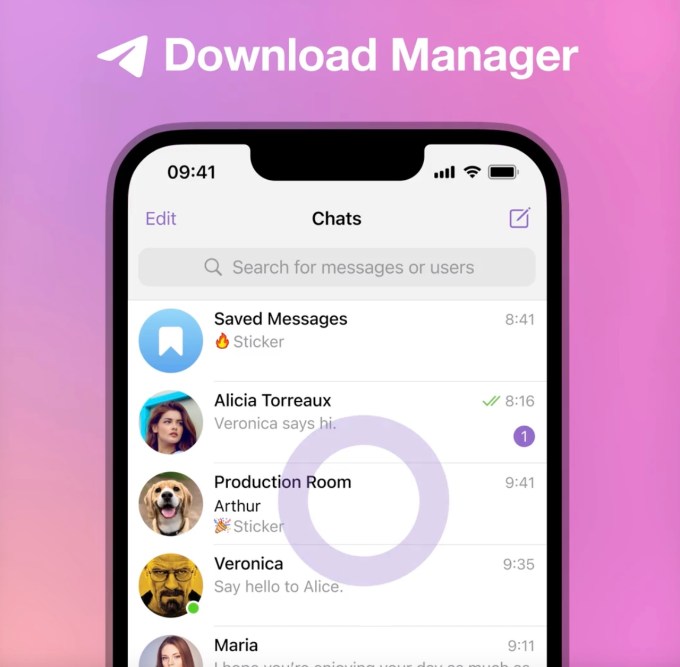
Image Credits: Telegram
- Telegram, an app being heavily utilized amid the Russia-Ukraine war right now, was updated with a download manager that will place a new icon in the Search bar to show files are actively being downloaded; users can then go to the Downloads tab in Search to view, manage, pause and resume all downloads or individual items, as well as adjust a download’s priority. It also introduced a new attachment menu where you can rearrange or remove items in an album while previewing it before sending. And notably, Telegram users can now broadcast from livestreaming tools like OBS Studio and XSplit Broadcaster, turning any Telegram channel into a TV station of sorts. This latter feature is timely, given how livestreams have become an important part of documenting the war. Other tweaks included the rollout of semi-transparent headers and footers on Android, a redesigned login flow on macOS and Android, new t.me pages, and a way to share t.me links to your phone number that opens a chat with you, so you can chat with someone without sharing your phone number with them.
Streaming & Entertainment
- Spotify reported 1.5 million subscriber cancellations due to the Russia-Ukraine war. The company also said that prior to the war, it had been trending ahead of its Q1 guidance of adding 8 million total users (with 3 million paying) — an indication that the Joe Rogan controversies had little impact on its business.
- TikTok launched a music distribution platform SoundOn, which allows artists to distribute to ByteDance’s platforms, including TikTok globally; music streamer Resso in Brazil, Indonesia and India; and to its video editor app CapCut. The service also distributes to global platforms including Apple Music, Spotify, Pandora, Deezer and Tencent’s Joox.
- Amazon suspended access to Prime Video in Russia, in addition to halting shipments in the country.
- AppleTV+ will soon stream two exclusive MLB “Friday Night Baseball” games per week across all platforms, in an exclusive deal.
- Apple said a new version of iMovie for iPad OS will ship next month.
- Walmart partnered with Spotify to offer six months of free streaming to its Walmart+ subscription customers, essentially its answer to Amazon Prime.
- TikTok suspended livestreaming and other new content uploads in Russia following the country’s new law that would impose prison sentences for spreading “fake news.”
Dating
- Bumble said it’s ceasing operations in Russia and exiting the Belarusian and Russian app stores. The company’s stock was up 41% following the news and its Q4 earnings.
- Tinder rolled out in-app access to background checks powered by nonprofit Garbo, which filters its background checks to remove non-violent offenses, like minor drug charges or traffic tickets. Parent company Match Group said the company’s other dating apps would receive the same access in the future.
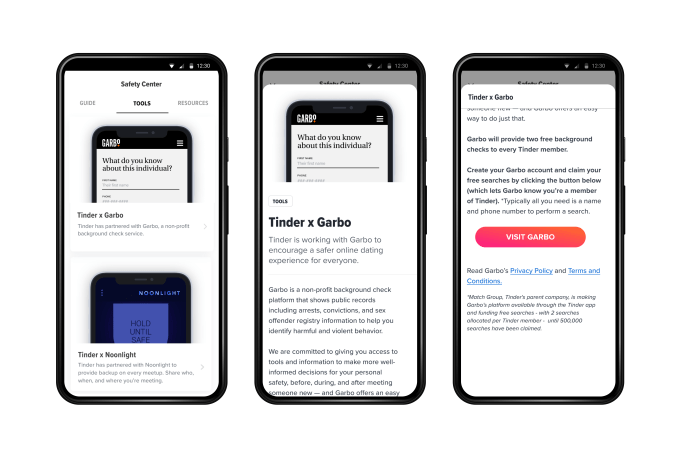
Image Credits: Tinder/Garbo
Gaming
- Microsoft pulled its Minecraft mobile game from the Russian App Store and Google Play following its announcement that it would suspend sales in the country.
Health & Fitness
- The FTC took action against the company formerly known as Weight Watchers, now called WW International Inc., for illegally collecting kids’ sensitive health data. Through its subsidiary, Kurbo Inc., WW International marketed a weight loss app for kids as young as eight years old, and collected their data without parents’ permission. The company was ordered to delete the data from kids under the age of 13, destroy algorithms derived from the data and pay a $1.5 million penalty.
- Meta’s Quest 2 VR headset now integrates with the Apple Health app and offers a mobile view of health stats in Meta’s own Oculus mobile app. Previously this sort of health data, including active time spent, calories burned, goals and progress, was only viewable in the headset.
Travel & Transportation
- Chinese ride-hailing giant Didi is halting its Hong Kong IPO listing preparations, says Bloomberg, after failing to appease Chinese regulator demands for overhauling how it handles sensitive user demand. Its app remained suspended from local app stores.
Utilities & Productivity
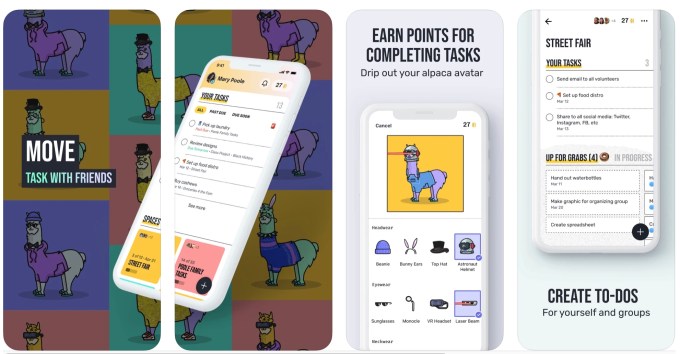
Image Credits: Meta
- Meta’s NPE Team launched a new tasks app called Move which aims to offer group organization and to-dos. Users in the app can earn points for participation, which they can then use for accessories for their alpaca avatar, which is visible to others.
- Sensor Tower reported the top 10 translation app downloads grew 71% in Ukraine, month over month, as over 2 million fled to neighboring countries and are now facing language barriers.
- Meanwhile, Russians are downloading VPN apps amid increased state censorship measures. Sensor Tower said the top five VPN apps jumped nearly 2,700% in the past week.
- Data.ai (formerly App Annie) made its daily app, game and SDK rankings Top Charts free for anyone to use. The charts cover more than 190 countries and 46 app store categories in a customizable view.
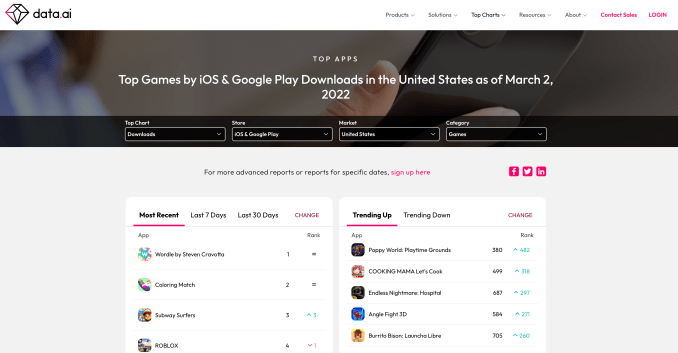
Image Credits: Data.ai
- A new grammar correction feature on Google’s Gboard keyboard works on your device to detect grammatical errors and offer suggestions while typing. The app also added over 2,000 more “emoji mashups” through its Emoji Kitchen feature which lets users make their own emoji stickers.
- Google added new features to its Google app for iPhone and iPad devices, including support for a Translate home screen widget and a new XL widget for Google Drive. It also updated its Gmail and Chat apps so a sender’s profile photo appears in the chat notification.
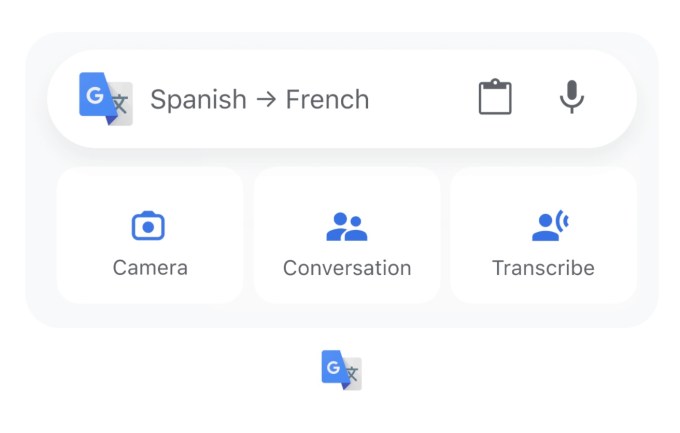
Image Credits: Google
Government & Policy
- South Korea approved rules on its app store law targeting Apple and Google. Lawmakers approved detailed rules for the law passed last year, that will now go into effect on March 15. The law bars the app store operators from forcing developers to use a specific payment method, and says operators cannot delay reviews or refuse, restrict, block or delete the registration, renewal or inspection of mobile content with third-party payment methods. Fines will be as high as 2% of average annual revenues from related business practices.
- Apple dismissed the findings of a U.K. regulator’s report on mobile ecosystems as being based on “unsubstantiated allegations and hypothetical concerns” from rivals seeking to make “deep changes to the iPhone” for their own commercial gain. The report included responses from dozens of companies, such as Google, Microsoft and Epic Games.
Security & Privacy
- Meta’s WhatsApp teamed up with Cloudflare to introduce Code Verify, an open source browser extension that verifies the authenticity of code served to the browser. The solution allows WhatsApp Web users to ensure their application has not been tampered with or altered.
- Mozilla added an HTTPS-only mode to Firefox Focus, its privacy-centric mobile browser. For every website you visit, the app will now automatically establish a secure and encrypted connection over HTTPS.
- A U.K. high court has granted permission for a class-action style privacy lawsuit to proceed against TikTok over its handling of children’s data. The suit is seeking damages on behalf of millions of children.
- TikTok is nearing a deal for Oracle to store its U.S. users’ data, Reuters said. The deal would better separate TikTok’s U.S. business from Chinese parent company ByteDance to assuage national security concerns. BuzzFeed News additionally reported on the plan, noting that internally, it’s referred to as Project Texas. The report says it’s not yet been decided how much control Beijing will have over the U.S.-based team, called U.S. Tech Services (USTS).
Funding and M&A
 Pokémon GO maker Niantic made its largest acquisition to date by snapping up an AR company called 8th Wall. The startup’s platform, which has been used to create over 50,000 WebAR experiences to date, will remain a standalone offering and will expand Niantic’s Lightship technology to WebAR.
Pokémon GO maker Niantic made its largest acquisition to date by snapping up an AR company called 8th Wall. The startup’s platform, which has been used to create over 50,000 WebAR experiences to date, will remain a standalone offering and will expand Niantic’s Lightship technology to WebAR.
 Mobile gaming unicorn Scopely invested $20 million in a new game development studio, Burlingame Studios, with plans to co-create a new title with the company. The investment is part of Scopely’s larger plan to expand its ecosystem of studios that it has built, bought or backed, it says.
Mobile gaming unicorn Scopely invested $20 million in a new game development studio, Burlingame Studios, with plans to co-create a new title with the company. The investment is part of Scopely’s larger plan to expand its ecosystem of studios that it has built, bought or backed, it says.
 Game streaming platform Loco raised $42 million to build a Twitch for India. The company has partnered with publishers like PUBG Corp., Activision Blizzard and Riot Games. It offers a mobile app where users watch and interact with streamers and support them via virtual goods.
Game streaming platform Loco raised $42 million to build a Twitch for India. The company has partnered with publishers like PUBG Corp., Activision Blizzard and Riot Games. It offers a mobile app where users watch and interact with streamers and support them via virtual goods.
 Savings and investing app Acorns raised $300 million in a Series F funding round that values the company at nearly $2 billion. The announcement came around six weeks after the consumer fintech startup dropped its plan for a $2.2 billion SPAC with Pioneer Merger Corp. in favor of an eventual traditional IPO.
Savings and investing app Acorns raised $300 million in a Series F funding round that values the company at nearly $2 billion. The announcement came around six weeks after the consumer fintech startup dropped its plan for a $2.2 billion SPAC with Pioneer Merger Corp. in favor of an eventual traditional IPO.
 Nigerian digital bank Yep! raised a $1.5 million pre-seed round led by Greenhouse Capital for its super app offering payments, remittance and other banking features.
Nigerian digital bank Yep! raised a $1.5 million pre-seed round led by Greenhouse Capital for its super app offering payments, remittance and other banking features.
 India-based 100ms raised $20 million in Series A funding for its technology that helps developers add live video conferencing and streams inside their apps for things like fitness, virtual events and more. It can also support audio rooms. Over 2,200 businesses are using its live video infrastructure.
India-based 100ms raised $20 million in Series A funding for its technology that helps developers add live video conferencing and streams inside their apps for things like fitness, virtual events and more. It can also support audio rooms. Over 2,200 businesses are using its live video infrastructure.
 Ghana-based unified payments app Dash raised $32.8 million in seed funding led by Insight Venture Partners, for its app offering an alternative payment network that brings together mobile money and traditional banks.
Ghana-based unified payments app Dash raised $32.8 million in seed funding led by Insight Venture Partners, for its app offering an alternative payment network that brings together mobile money and traditional banks.
 A Makers Fund-backed virtual social app MEW confirmed it had raised nearly $10 million in total funding to date, including from China’s 5Y Capital and Zoo Capital. The funds were raised last year, but had not been previously reported.
A Makers Fund-backed virtual social app MEW confirmed it had raised nearly $10 million in total funding to date, including from China’s 5Y Capital and Zoo Capital. The funds were raised last year, but had not been previously reported.
Downloads
Amazon’s Amp
Amazon’s Clubhouse competitor arrived this week. The retail giant on Tuesday launched a new mobile app called Amp, which allows people to create live “radio shows” where they can act as a DJ by taking callers and playing tracks from its catalog of tens of millions of licensed songs, ranging from classic titles to today’s music.
While most Clubhouse rivals have focused on talk — like live podcasts — Amazon’s Amp differentiates itself by providing access out of the gate to a broad music catalog. That means Amp users can play DJ, streaming and chatting about their favorite songs and artists to establish themselves as a creator. Or they can use the app to talk about anything else — like sports or pop culture, for example — but do so while also curating a selection of music for their listeners and taking live callers.
The app will also feature shows from Nicki Minaj, Pusha T, singer-songwriter Tinashe, electronic artist and violinist Lindsey Stirling, Travis Barker, Lil Yachty and Big Boi; well-known personalities Tefi Pessoa and Nikita Dragun; popular radio hosts Zach Sang, Kat Corbett, Christian James Hand, and Guy Raz; and writers from music and culture publication The FADER.
The app is available in a limited U.S. beta, and users will need to seek out an invite to get in.
Substack for iOS
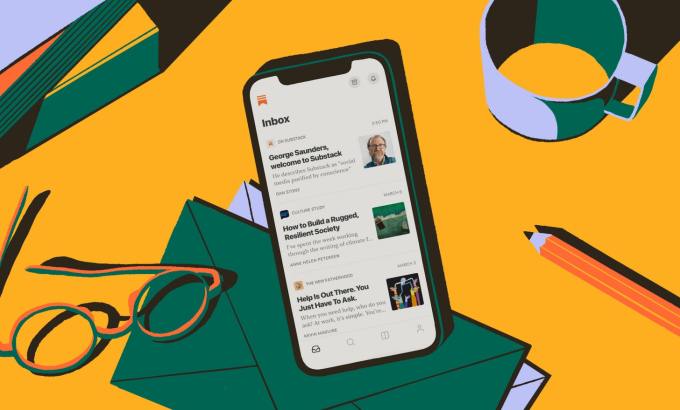
Image Credits: Substack
Subscription newsletter platform Substack announced this week it’s launching a dedicated app on iOS for reading that organizes all your Substrack email newsletter subscriptions in one place. Substack writers, meanwhile, will benefit if their readers install the app, as they’ll get reliable delivery of their publications and their other media in one place. Users can also choose to turn off emails (!!!) if they want to get the publications just inside the app. The company said it’s working to develop more features to better support podcasters, videomakers, community leaders and more in addition to readers and writers. The company previously introduced a Substack Reader on the web, which offered a similar way to organize and aggregate all your subscriptions in one place; now that offering is mobile.
The app, however, has a bit of Google Reader-like vibe to it, in the sense that it’s allowing a user to build out a reading list of their favorite publications. But while Reader was built on open standards, like RSS, Substack is trying to lock you inside their world — one which increasingly feels like a publisher’s own content platform.
Plus, Substack readers didn’t necessarily need a dedicated app to read their newsletters outside of their inbox — plenty of reading apps, from RSS readers like Feedly to new startups like Matter, allow for this functionality, too.
from TechCrunch https://ift.tt/lanKzMf
via Tech Geeky Hub



No comments:
Post a Comment